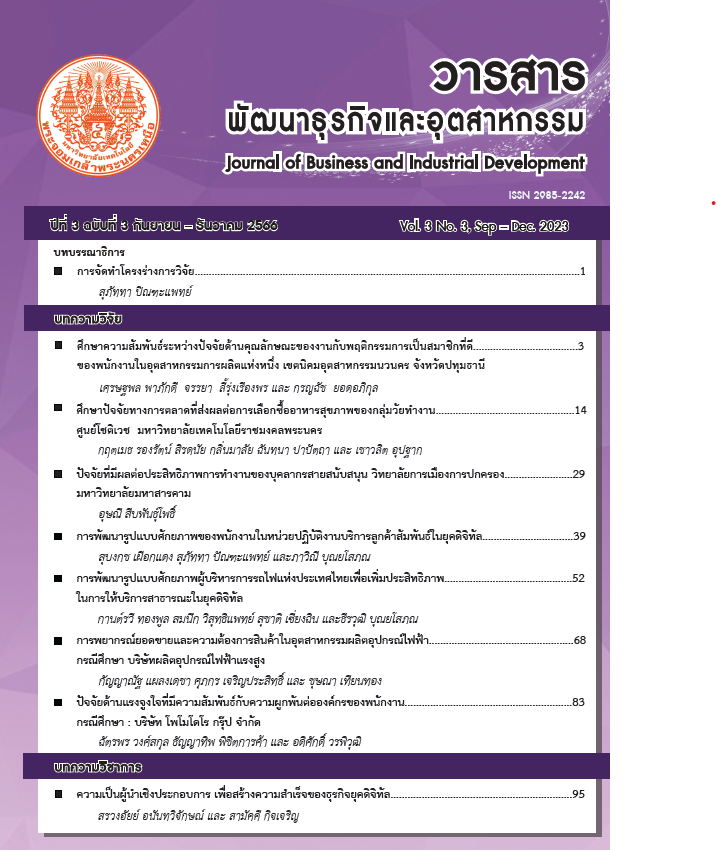การพัฒนารูปแบบศักยภาพผู้บริหารการรถไฟแห่งประเทศไทยเพื่อเพิ่มประสิทธิภาพในการให้บริการสาธารณะในยุคดิจิทัล
คำสำคัญ:
การพัฒนารูปแบบศักยภาพ, ผู้บริหารการรถไฟแห่งประเทศไทย, การให้บริการสาธารณะในยุคดิจิทัลบทคัดย่อ
การวิจัยนี้มีวัตถุประสงค์เพื่อ 1) ศึกษาองค์ประกอบของศักยภาพผู้บริหารการรถไฟแห่งประเทศไทยเพื่อเพิ่มประสิทธิภาพในการให้บริการสาธารณะในยุคดิจิทัล 2) พัฒนารูปแบบศักยภาพผู้บริหารการรถไฟแห่งประเทศไทยเพื่อเพิ่มประสิทธิภาพในการให้บริการสาธารณะในยุคดิจิทัล และ 3) จัดทำคู่มือแนวทางการพัฒนาศักยภาพผู้บริหารการรถไฟแห่งประเทศไทยเพื่อเพิ่มประสิทธิภาพในการให้บริการสาธารณะในยุคดิจิทัล ประชากรที่ใช้ในการวิจัยครั้งนี้ ประกอบด้วย กลุ่มผู้เชี่ยวชาญและผู้ทรงคุณวุฒิ จำนวน 23 คน และกลุ่มผู้ตอบแบบสอบถาม ได้แก่ พนักงานการรถไฟที่ดำรงตำแหน่งผู้บริหารระดับต้นขึ้นไป จำนวน 265 คน เครื่องมือที่ใช้ ได้แก่ แบบสัมภาษณ์และแบบสอบถาม สถิติที่ใช้ ได้แก่ ค่าความถี่ ค่าร้อยละ ค่าเฉลี่ย ส่วนเบี่ยงเบนมาตรฐาน และการวิเคราะห์องค์ประกอบเชิงสำรวจ ผลการวิจัยพบว่า รูปแบบของศักยภาพผู้บริหารการรถไฟแห่งประเทศไทยเพื่อเพิ่มประสิทธิภาพในการให้บริการสาธารณะในยุคดิจิทัล ประกอบด้วย 4 องค์ประกอบหลัก ได้แก่ 1.ด้านความรู้ ประกอบด้วย 5 องค์ประกอบย่อย คือ 1) ภารกิจและเป้าหมายองค์กร 2) โลจิสติกส์ 3) การบริหารจัดการองค์กร 4) เทคโนโลยีเพื่อการให้บริการ และ 5) การบริหารจัดการองค์กร 2. ด้านทักษะ ประกอบด้วย 4 องค์ประกอบย่อย คือ 1) การวิเคราะห์และตัดสินใจ 2) การแปลงวิสัยทัศน์ไปสู่กลยุทธ์ 3) การบริหารการเปลี่ยนแปลง และ 4) การสร้างและบริหารงานเชิงระบบ 3.ด้านคุณลักษณะที่พึงประสงค์ ประกอบด้วย 4 องค์ประกอบย่อย คือ 1) การเป็นผู้นำที่มีวิสัยทัศน์ 2) การเป็นผู้ที่ประพฤติตนดีเป็นแบบอย่างได้ 3) การเป็นผู้มีคุณธรรม จริยธรรม จิตสำนึกดี และ 4) การเป็นผู้มีความคิดสร้างสรรค์ และ 4. ด้านการปฏิบัติการเตรียมความพร้อม ประกอบด้วย 4 องค์ประกอบย่อย คือ 1) นโยบายสาธารณะระบบขนส่งทางราง 2) ความสอดคล้องกับมาตรฐานสากล 3) ระบบเทคโนโลยีสารสนเทศเพื่อการบริการ และ 4) การเปลี่ยนผ่านสู่องค์กรดิจิทัล รูปแบบและคู่มือแนวทางได้รับความเห็นชอบจากผู้ทรงคุณวุฒิด้วยมติเป็นเอกฉันท์ในด้านความเหมาะสมและสามารถนำไปประยุกต์ใช้ในการพัฒนาศักยภาพของผู้บริหารการรถไฟแห่งประเทศไทยได้
เอกสารอ้างอิง
Office of the National Economic and Social Development Board. (2023, May 2). Draft National Strategy for 20 Years. Active Learning: Learning for All. https://spm.thaigov.go.th/ (in Thai).
Ministry of Transport. (2023, May 2). Strategic Plan for Developing the Transportation System for a Period of 20 Years (2017–2036). Active Learning: Learning for All. https://web.dlt.go.th/dlt-direction/media/ (in Thai).
Tris Corporation Company Limited. (2023, April 24). Current Business Operations of the State Railway of Thailand. Active Learning: Learning for All. https://www.tris.co.th (in Thai).
Vygotsky, L. S. (1987). The Collected Works of L. S. Vygotsky. Problem of General. W.R. Rieber & A. Carton, Eds. New York, Plenum.
Thananun, S. (2009). Human Resource Development. Faculty of Public Administration, National Institute of Development Administration. (in Thai).
McClelland, David C. (1973). Testing for Competence Rather Than Intelligence. American Psychologist. http://www.ei.Haygroup.com.
Thianprom, D. (2003). Core Human Competencies. Nagoda Company Limited.
Koontz, H., & H. Weihrich. (1988). Essentials of Management. New York: Mc Graw–Hill Book Company.
Robbins, Bergman, Stagg, & Coulter. (1989). Organization Behavior. (11thed.). New Jersey: Pearson Prentice Hall.
Sararatana, W. (1999). Administration, Principles, Theories, and Educational Issues. Aksarapipat Company. (in Thai).
Yamane, Taro. (1973). Statistics an Introduction Analysis. (2nd ed). New York: Harper & Row.
Phokhan, R. (2005). Perception of Leadership and Work Potential of Public Health Officials in Nonthaburi Province. [Unpublished master’s thesis]. Kasetsart University. (in Thai).
Kingwongsa, P. (2021). Model of the Potential of Human Resource Executives in Becoming Business Partners. Journal of Buddhist Social Sciences and Anthropology, 6(1), 227–251.
(in Thai).
Pattanaphong, W. (2003). BSC and KPI for Sustainable Organizational Growth. Pacific Publishing House. (in Thai).
Panithanwong, Y. (2020). Potential Development Model for Executives in the Construction Industry according to Thailand 4.0. King Mongkut's University of Technology North Bangkok Academic Journal. 30(2), 351–360. (in Thai).
Hongwilai, S. (2004). The Ultimate Management Strategy Chart. National Productivity Institute. (in Thai).
Prasatkaew, T. (2020). Development of Middle Management Potential Models for Competition in the Aviation Industry. King Mongkut's University of Technology North Bangkok Academic Journal. 30(4), 717–725. (in Thai).
Asawakornnirangkun. P. (2019). Adaptation of Thai Logistics Service Providers in the Digital Era. Journal of Humanities and Social Sciences Rajapruek University, Supplementary edition, December, 16–30. (in Thai).
Chadtanim. C. (2022.) Developing a Potential Model for Human Resource Managers for Industrial Businesses in the New Normal Era. Journal of Nakhon Lampang Sangha College, 11(1),123–138. (in Thai).
ดาวน์โหลด
เผยแพร่แล้ว
รูปแบบการอ้างอิง
ฉบับ
ประเภทบทความ
สัญญาอนุญาต

อนุญาตภายใต้เงื่อนไข Creative Commons Attribution-NonCommercial-NoDerivatives 4.0 International License.





